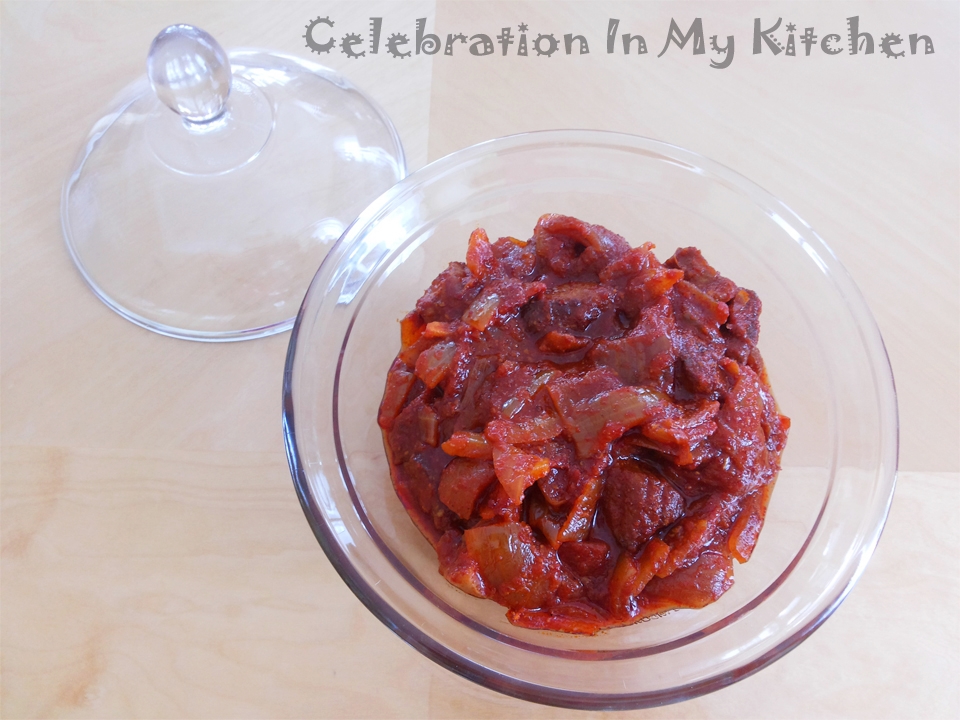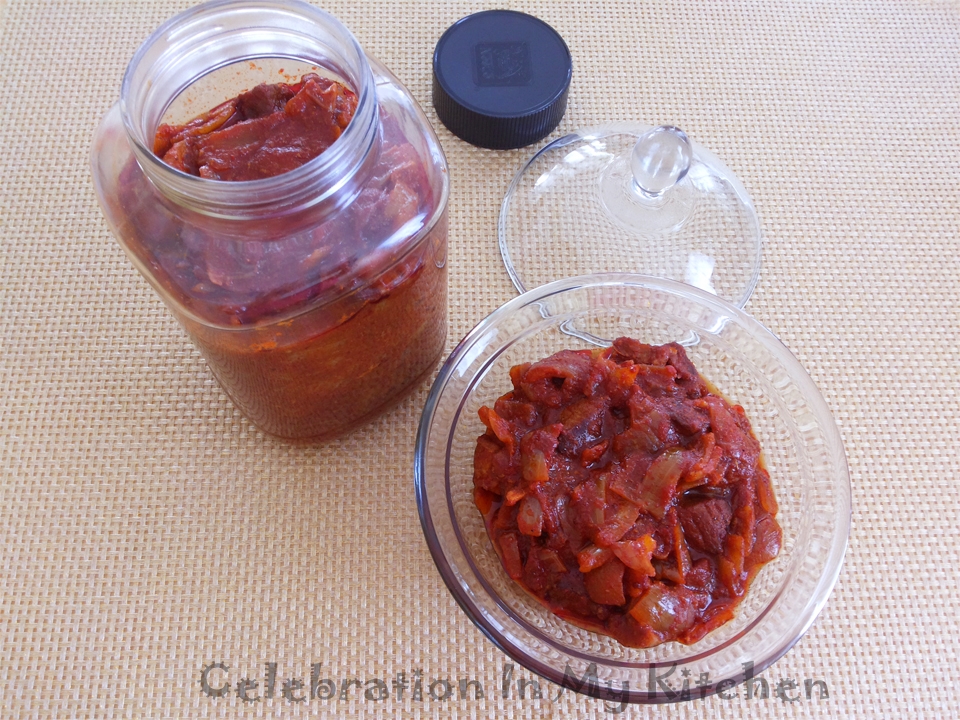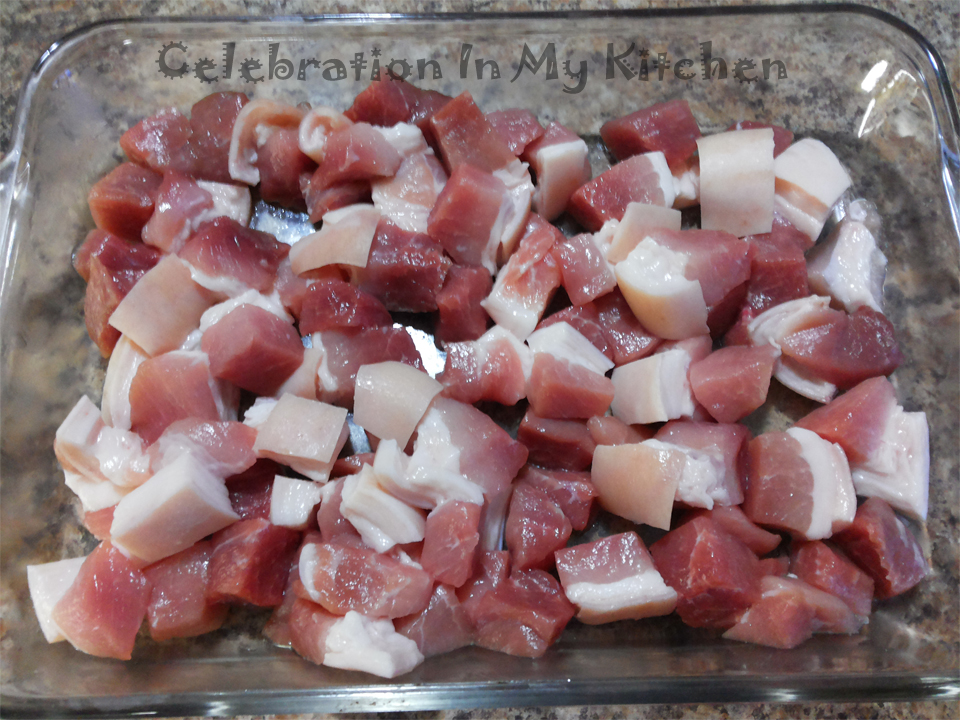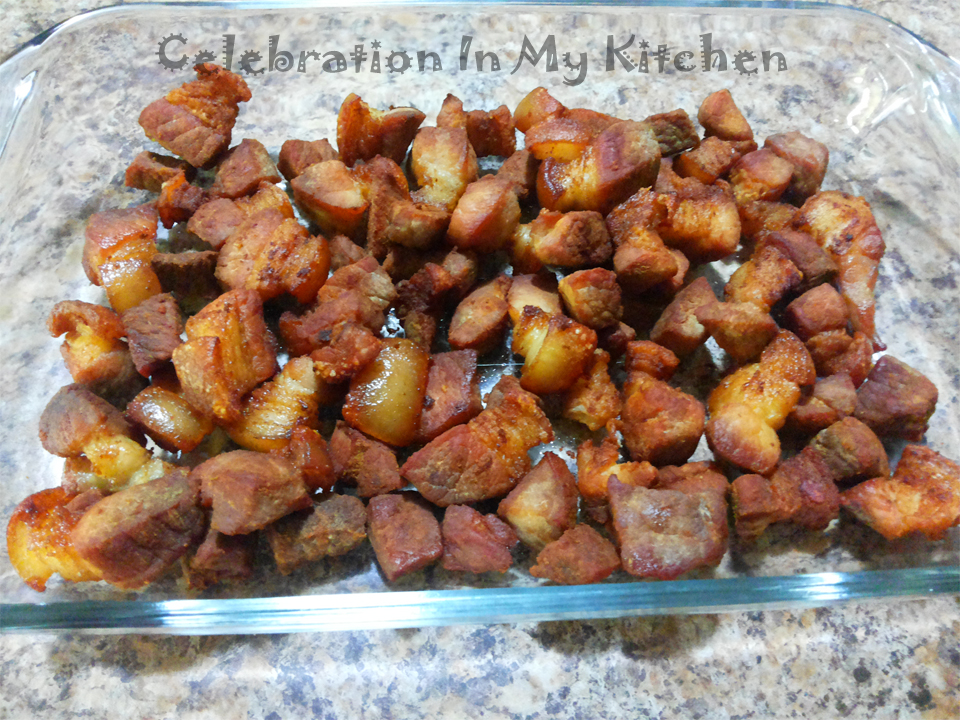Balchão is a popular dish known for its piquant character. It was brought to Goa by the Portuguese and originated in Macao, where it is called balichão. Prepared with either seafood or pork in a spicy, vinegary sauce and usually preserved for the monsoons to be consumed when fish is scarce. More like a pickle and eaten in moderation. The traditional balchão has an addition of paste made from galmbo (dried shrimps) which is frequently omitted due to its strong flavour overpowering the dish.
This is my mother's recipe with the pork pieces first fried till crisp to remove all moisture for a better shelf life. Once fried, they are cooked in a fiery, tangy sauce, perfectly balanced with a dash of sugar. No water or tomatoes are used in the preparation. The pickled pork is relished with steaming hot rice and curry. It is mouthwateringly delicious, tantalizing your tastebuds leaving you craving for more.
Vinegar is the most versatile ingredient in the kitchen. Besides its use for salad dressings and pickling, vinegar is added to food for a hint of sourness and to balance the overall flavour. Useful as an all-purpose household cleaner, antiseptic, cheap and has an indefinite shelf life. Also, known to have various health benefits, especially raw, organic apple cider vinegar which helps burn fat by improving metabolism leading to weight loss. Detoxifies the body and eliminates harmful bacteria in the digestive tract. Reduces spike in blood glucose and insulin levels. The word “vinegar” is derived from the French word “vinaigre” literally meaning “sour wine.”
This is my mother's recipe with the pork pieces first fried till crisp to remove all moisture for a better shelf life. Once fried, they are cooked in a fiery, tangy sauce, perfectly balanced with a dash of sugar. No water or tomatoes are used in the preparation. The pickled pork is relished with steaming hot rice and curry. It is mouthwateringly delicious, tantalizing your tastebuds leaving you craving for more.
Vinegar is the most versatile ingredient in the kitchen. Besides its use for salad dressings and pickling, vinegar is added to food for a hint of sourness and to balance the overall flavour. Useful as an all-purpose household cleaner, antiseptic, cheap and has an indefinite shelf life. Also, known to have various health benefits, especially raw, organic apple cider vinegar which helps burn fat by improving metabolism leading to weight loss. Detoxifies the body and eliminates harmful bacteria in the digestive tract. Reduces spike in blood glucose and insulin levels. The word “vinegar” is derived from the French word “vinaigre” literally meaning “sour wine.”
Pork Balchão
(Yields 2 kgs)
Ingredients:
1 1/2 kgs boneless pork (cut into cubes)
4 large onions (chopped into thick slices)
1 cup palm or apple cider vinegar
1/2 cup oil
salt
Grind to a paste (with 1 cup palm or apple cider vinegar)
30 dried red Kashmiri chillies
15 peppercorns
10 cloves
3 cinnamon sticks (1.5" each)
1 1/2 teaspoons cumin seeds
1 teaspoon turmeric powder
10 large cloves of garlic
1 1/2 " piece of ginger
1 teaspoon sugar
salt
Method:
Wash pork pieces, pat dry and season with salt.
In a non-stick skillet, heat 1 tablespoon of oil and fry the pork pieces on low heat in batches till crisp. Drain on absorbent paper towels and keep aside. (Any excess fat released from the pork should be kept aside for future use or can be discarded.)
Note: It took me around two hours to fry 1 1/2 kgs of pork, roughly a little over half-an-hour for every 1/2 kg.
On medium flame, heat oil in a pan and fry onions till light brown in colour. Add the spice paste and cook on low heat till oil starts to separate. Stir in the pork pieces, coat well and add 1 cup vinegar. Cook on low heat till oil rises to the top. Check for seasoning, add sugar and salt to balance the flavour.
Cool and then store in sterilized glass bottle. The balchão can be consumed after a week. Just reheat the required amount before serving. Refrigerate for a longer shelf life.
Note:
(Yields 2 kgs)
Ingredients:
1 1/2 kgs boneless pork (cut into cubes)
4 large onions (chopped into thick slices)
1 cup palm or apple cider vinegar
1/2 cup oil
salt
Grind to a paste (with 1 cup palm or apple cider vinegar)
30 dried red Kashmiri chillies
15 peppercorns
10 cloves
3 cinnamon sticks (1.5" each)
1 1/2 teaspoons cumin seeds
1 teaspoon turmeric powder
10 large cloves of garlic
1 1/2 " piece of ginger
1 teaspoon sugar
salt
Method:
Wash pork pieces, pat dry and season with salt.
In a non-stick skillet, heat 1 tablespoon of oil and fry the pork pieces on low heat in batches till crisp. Drain on absorbent paper towels and keep aside. (Any excess fat released from the pork should be kept aside for future use or can be discarded.)
Note: It took me around two hours to fry 1 1/2 kgs of pork, roughly a little over half-an-hour for every 1/2 kg.
On medium flame, heat oil in a pan and fry onions till light brown in colour. Add the spice paste and cook on low heat till oil starts to separate. Stir in the pork pieces, coat well and add 1 cup vinegar. Cook on low heat till oil rises to the top. Check for seasoning, add sugar and salt to balance the flavour.
Cool and then store in sterilized glass bottle. The balchão can be consumed after a week. Just reheat the required amount before serving. Refrigerate for a longer shelf life.
Note:
- Substitute part of the dried Kashmiri red chillies with hot chillies of your choice. Alternatively, you could deseed the chillies for less heat.
- Adjust spice and sourness according to your taste. Add a dash of sugar to balance the flavour.
- If desired, you can add 1 tablespoon of dried prawn powder along with the spice paste.





